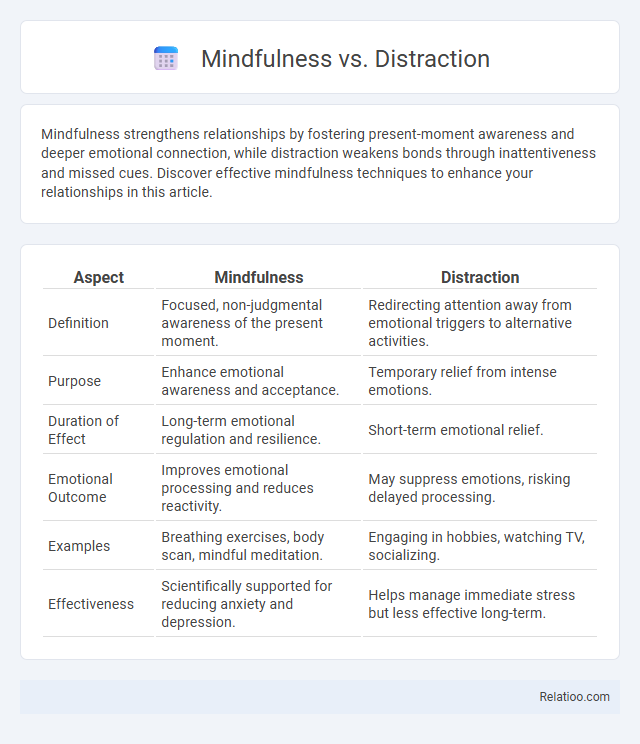Mindfulness strengthens relationships by fostering present-moment awareness and deeper emotional connection, while distraction weakens bonds through inattentiveness and missed cues. Discover effective mindfulness techniques to enhance your relationships in this article.
Table of Comparison
| Aspect | Mindfulness | Distraction |
|---|---|---|
| Definition | Focused, non-judgmental awareness of the present moment. | Redirecting attention away from emotional triggers to alternative activities. |
| Purpose | Enhance emotional awareness and acceptance. | Temporary relief from intense emotions. |
| Duration of Effect | Long-term emotional regulation and resilience. | Short-term emotional relief. |
| Emotional Outcome | Improves emotional processing and reduces reactivity. | May suppress emotions, risking delayed processing. |
| Examples | Breathing exercises, body scan, mindful meditation. | Engaging in hobbies, watching TV, socializing. |
| Effectiveness | Scientifically supported for reducing anxiety and depression. | Helps manage immediate stress but less effective long-term. |
Understanding Mindfulness: A Brief Overview
Mindfulness involves maintaining focused awareness on the present moment, recognizing thoughts and feelings without judgment, which enhances emotional regulation and stress resilience. Distraction temporarily shifts attention away from stressors, offering short-term relief but often delaying emotional processing. Coping skills encompass a range of strategies, including mindfulness practices, that help individuals effectively manage stress and promote mental well-being.
The Nature of Distraction in Modern Life
Distraction in modern life often stems from the constant barrage of digital notifications, social media feeds, and multitasking demands that fragment attention and reduce cognitive clarity. This pervasive nature of distraction undermines mindfulness, which emphasizes present-moment awareness and deliberate focus as essential coping skills for managing stress and enhancing mental resilience. Cultivating mindfulness strengthens neural pathways related to attention regulation, enabling individuals to resist distraction and employ adaptive coping mechanisms effectively.
How Mindfulness Impacts Mental Wellbeing
Mindfulness enhances mental wellbeing by fostering present-moment awareness, which reduces rumination and stress compared to distraction or coping skills that often provide temporary relief. It promotes emotional regulation through non-judgmental observation of thoughts and feelings, leading to sustained psychological resilience. Research shows consistent mindfulness practice improves neural plasticity in brain areas linked to attention and emotional control, supporting long-term mental health benefits.
The Costs of Chronic Distraction
Chronic distraction impairs cognitive function, reducing your ability to concentrate, retain information, and perform tasks efficiently. Unlike mindfulness, which enhances awareness and emotional regulation, persistent distraction leads to increased stress, poor decision-making, and lower productivity. Developing effective coping skills helps manage distractions, fostering mental clarity and greater resilience in daily activities.
Mindfulness vs Distraction: Key Differences
Mindfulness involves maintaining a focused, non-judgmental awareness of the present moment, enhancing emotional regulation and reducing stress. Distraction, conversely, diverts attention away from current experiences to avoid discomfort but may undermine long-term emotional resilience. Understanding these key differences helps you cultivate effective coping skills by promoting mindful awareness rather than temporary escape through distraction.
Neuroscience: How the Brain Responds to Each
Mindfulness activates the prefrontal cortex, enhancing attention regulation and emotional control by increasing activity in the anterior cingulate cortex and insula, which improves self-awareness and reduces stress. Distraction shifts neural processing away from the prefrontal cortex towards sensory regions, temporarily suppressing pain and negative emotions but often resulting in less effective long-term emotional regulation. Coping skills engage the limbic system and prefrontal cortex through cognitive reappraisal, promoting adaptive emotional responses and strengthening neural pathways involved in resilience and stress management.
Benefits of Embracing Mindfulness Practices
Embracing mindfulness practices enhances your ability to stay present and fully engage with the current moment, reducing stress and improving emotional regulation compared to distraction techniques. Unlike distraction, which temporarily shifts focus away from discomfort, mindfulness cultivates awareness and resilience, fostering long-term mental clarity and well-being. Developing mindfulness as a coping skill supports better decision-making, lowers anxiety levels, and promotes sustainable mental health benefits.
Common Triggers and Sources of Distraction
Common triggers for distraction often include stress, environmental noise, and digital notifications, which interrupt your mental focus and reduce productivity. Mindfulness practices help by increasing awareness of these triggers, allowing you to observe thoughts without judgment and refocus attention intentionally. Effective coping skills involve identifying personal sources of distraction and implementing strategies such as time management, deep breathing, or setting boundaries to maintain emotional balance and improve concentration.
Practical Strategies: Shifting from Distraction to Mindfulness
Practical strategies to shift from distraction to mindfulness include grounding techniques such as deep breathing and body scans that anchor your attention to the present moment. Incorporating mindful pauses during daily activities helps you recognize and gently redirect your focus away from habitual distractions toward intentional awareness. Cultivating coping skills like journaling or short meditation sessions strengthens your ability to manage stress without resorting to avoidance, enhancing your overall mental resilience.
Cultivating a Mindful Lifestyle for Lasting Balance
Cultivating a mindful lifestyle involves practicing mindfulness techniques that enhance present-moment awareness, reducing the tendency to seek distraction as a coping skill. Unlike distraction, which temporarily diverts attention from stressors, mindfulness promotes emotional regulation and resilience by fostering acceptance and non-judgmental observation of thoughts and feelings. Integrating mindfulness into daily routines supports lasting balance by improving mental clarity, reducing anxiety, and strengthening adaptive coping mechanisms.

Infographic: Mindfulness vs Distraction
 relatioo.com
relatioo.com